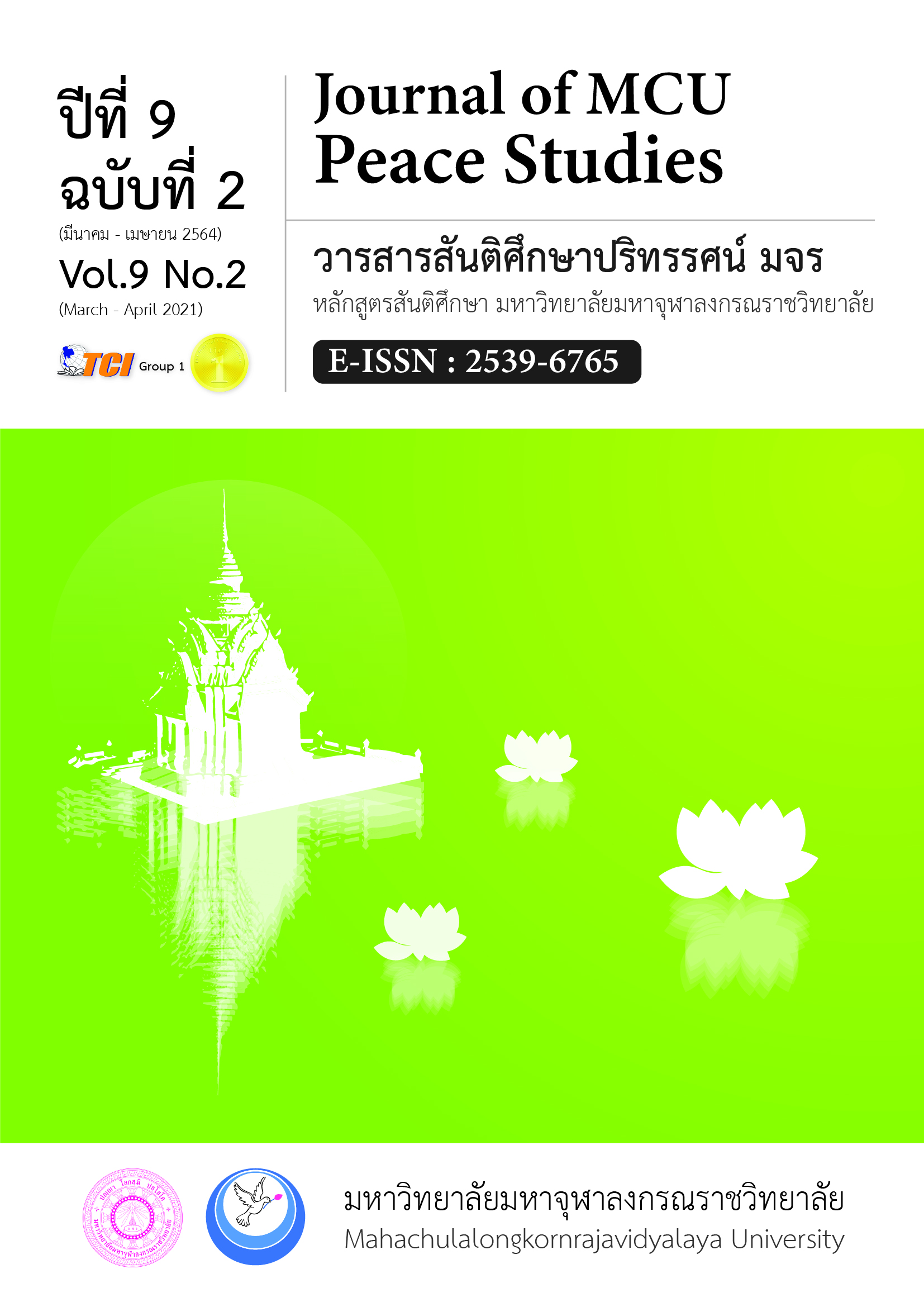รูปแบบการเรียนรู้โดยใช้ทีมเป็นฐาน ปัญหาเป็นฐาน และโครงงานเป็นฐานที่ส่งผล ต่อผลลัพธ์การเรียนรู้ตามกรอบมาตรฐานคุณวุฒิระดับอุดมศึกษา -
Main Article Content
บทคัดย่อ
บทความวิจัยนี้มีวัตถุประสงค์ 1) เพื่อสร้างกระบวนการเรียนรู้ 2) เพื่อจัดกิจกรรมกระบวนการเรียนรู้ 3) เพื่อพัฒนาโมเดลความสัมพันธ์เชิงสาเหตุของการเรียนรู้โดยใช้ทีมเป็นฐาน ปัญหาเป็นฐาน และโครงงานเป็นฐานที่ส่งผลต่อผลลัพธ์การเรียนรู้ตามกรอบมาตรฐานคุณวุฒิระดับอุดมศึกษา กลุ่มทดลองคือ นักศึกษาระดับปริญญาตรีหลักสูตรการศึกษาบัณฑิต จำนวน 30 คน โดยการสุ่มตัวอย่างแบบกลุ่ม เครื่องมือที่ใช้ คือ เครื่องมือในการวิจัยมี 3 ชนิดคือ แบบบันทึกกิจกรรม แบบวัดความพึงพอใจ และข้อสอบ โดยสองชนิดแรก บันทึกเป็นคะแนนค่าสังเกตของโมเดลการวัดชนิดรวมตัว จำนวนสามโมเดลคือ ตัวแปรแฝง TBL, PBL1 และ PBL2 ได้แก่ ค่าสังเกต TQF, 7C, OBE, Individual1, Group1, Individual2, Group2 และชนิดหลังเป็นคะแนนค่าสังเกตของโมเดลการวัดชนิดสะท้อน ได้แก่ ผลลัพธ์การเรียนรู้ตามกรอบมาตรฐานคุณวุฒิระดับอุดมศึกษา
ผลการวิจัย พบว่า 1) กระบวนการเรียนรู้มี 4 องค์ประกอบ คือ การกำหนดวัตถุประสงค์การเรียนรู้ การออกแบบการเรียนการสอน การออกแบบองค์ประกอบและผลลัพธ์การเรียนรู้ และการประเมินผลการเรียนรู้ 2) กิจกรรมกระบวนการเรียนรู้มี 3 ด้าน คือการใช้ทีมเป็นฐานเรียนรู้ (TBL) ปัญหาเป็นฐานการเรียนรู้ (PBL) และโครงงานเป็นฐานการเรียนรู้ (PBL) ทุกกิจกรรมกระบวนการเรียนรู้มีความเหมาะสมสามารถจัดกระบวนการเรียนรู้เพื่อส่งผลต่อผลลัพธ์การเรียนรู้ตามกรอบมาตรฐานคุณวุฒิระดับอุดมศึกษาได้ 3) โมเดลความสัมพันธ์เชิงสาเหตุของการเรียนรู้โดยใช้ทีมเป็นฐาน ปัญหาเป็นฐาน และโครงงานเป็นฐานส่งผลต่อผลลัพธ์การเรียนรู้ตามกรอบมาตรฐานคุณวุฒิระดับอุดมศึกษา มีอิทธิพลทางอ้อม (Indirect Effect) เท่ากับ (0.975) x (0.679) = 0.662 และมีนัยสำคัญทางสถิติที่ระดับ 0.01
Article Details
ทัศนะและความคิดเห็นที่ปรากฏในบทความในวารสาร ถือเป็นความรับผิดชอบของผู้เขียนบทความนั้น และไม่ถือเป็นทัศนะและความรับผิดชอบของกองบรรณาธิการ ยินยอมว่าบทความเป็นลิขสิทธิ์ของวารสาร
เอกสารอ้างอิง
Phanthumnavin, D. (2005). "Behavioral Science Research for Human and Social Development." In the Workshop for the use and production of psycho-behavioral research for the benefit of Thai society. Bangkok: National Research Council of Thailand.
Kwankaew, P. et al. (2016). Learning and Teaching Management by Project Based Learning on Creativity for Certificate Students High School Secretarial Department. Southern Technology Journal, 9(1), 1-6.
Wasi, P. (2000). Intellectual strategy and educational reform that led the country out of crisis. Bangkok: Prikwangraphic.
Leikitwattana, P. (2008). Characteristics and Situations Affecting Electronic Learning Behavior of Upper Secondary School Students. Bangkok: Faculty of Industrial Education, King Mongkut's Institute of Technology Ladkrabang.
Sinlarat, P. (2011). Principles and techniques of higher education. (4th ed). Bangkok: Office of Chulalongkorn University.
Sinlarat, P. et al. (2010). New leadership, new globalization in the Thai higher education system, university council committee: new mission and new higher education. Bangkok: Dhurakij Pundit University Press.
Panich, W. (2012). The Way of Learning for Students in the 21st Century. (3rd ed). Bangkok: Sodsri-Saritwong Foundation.
Office of the Higher Education Commission (2013). The 11th higher education development plan (2008-2016). Bangkok: Chulalongkorn University.
Office of the Higher Education Commission (2009). Thai Qualifications Frame for Higher Education. Documents for training, Office of the Higher Education Commission, 15 July 2009, Office of the Higher Education Commission.
Office of the National Economic and Social Development Board (2016). The 12th National Economic and Social Development Plan 2017-2021. Retrieved September 20, 2019, from http://www.ratchakitcha.soc.go.th/DATA/PDF/2016//A/115/1.PDF.
Candela, L.L. (1998). “Problem Based Learning versus Lecture: Effects on Multiple Choicen Test Scores in Associate Degree Nursing Student”. Thai Dental Nurse Journal, 29(2), 177.
Fornell, C., & Bookstein, F. L. (1982). Two Structural Equation Models: LISREL and PLS Applied to Consumer Exit-Voice Theory. Journal of Marketing Research, 19, 440-452.
Guzdial, M. (1998). Technological support for project-based learning. In ASCD yearbook1998: Learning with technology, 14, 47-71.
Michaelsen LK., & Sweet, M. (2015). The Essential elements of team-based learning. In: Michaelsen LK, Sweet M, Parmalee DX, editors. Team-based learning: small group learning’s next big step: New Directions in Teaching and Learning [Internet]. San Francisco: Jossey-Bass.
Pogge E. (2013). A Team-Based Learning Course on Nutrition and Lifestyle Modification. Am J Pharm Educ, 77(5), 103.
Rossiter, J. R. (2002). The C-OAR-SE procedure for scale development in marketing. International Journal of Research in Marketing, 19, 305–335.
Trop, L & Sage, S. (1998). Problem-based Learning for K-12. Alexandria, Virginia: Association for Supervision and Curriculum Development.


